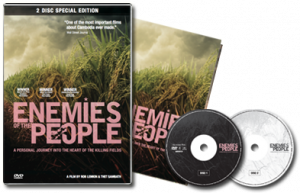Home Video Hovel- Enemies of the People
 It would seem that when a documentarian has found a good enough subject, all he or she should have to do is set the film in motion, then get out of the way of it and allow the story to tell itself. Yet the truth is that a good filmmaker will only appear to have gotten out of the way. A documentary, no matter how compelling its focus, is still a film and it needs to be guided. With Enemies of the People, co-directors Thet Sambath and Rob Lemkin may look to be largely hands-off (even as Thet is involved in the tale) but in reality, their hands are in every frame, gently pushing their movie toward its end result as one of the most potent documentaries in years.
It would seem that when a documentarian has found a good enough subject, all he or she should have to do is set the film in motion, then get out of the way of it and allow the story to tell itself. Yet the truth is that a good filmmaker will only appear to have gotten out of the way. A documentary, no matter how compelling its focus, is still a film and it needs to be guided. With Enemies of the People, co-directors Thet Sambath and Rob Lemkin may look to be largely hands-off (even as Thet is involved in the tale) but in reality, their hands are in every frame, gently pushing their movie toward its end result as one of the most potent documentaries in years.
Thet is a journalist for an English language newspaper in Cambodia. His father and brother were killed by the Khmer Rouge during their genocidal 1975-1979 reign (his mother was then forced to marry one of the party’s cadres). In all, around 2 million people died – some murdered, others allowed to starve or die of disease – during these years. That number made up, at the time, approximately one quarter of Cambodia’s population. At the time of the documentary, Thet had spent the previous ten years or so interviewing soldiers who carried out the executions as well as Nuon Chea, the highest-ranking surviving member of the Khmer Rouge. Second in command to Pol Pot, Nuon was known as Brother Number Two. Until he was finally arrested in 2007, he lived in freedom with his wife.
As sickly fascinating a presence as Nuon is merely by the fact of his past actions, the most interesting presences in the film belong to the former soldiers. Now older men, Thet and Lemkin present them without judgment. It is surprising how quickly and easily, with little to no moral wrestling, they being to take a sympathetic shape. The two we see most, named Khoun and Soun, are remorseful for what they did. Yet they do not seem anguished. Most likely, that part already happened, years ago. Now they wish to speak frankly and openly about what they did as a way of atoning or at least seeking some measure of forgiveness, as well as moving toward justice for those they murdered. These men have no qualms about naming their past cohorts and detailing their actions. In one queasy but weighty section, one of them demonstrates on a young man the way he would hold down his victims as he slit their throats and how he eventually resorted to simply stabbing them in the jugular as the slicing motion began to wear on his wrists after killing so many.
Nothing so empirical or immediate is reached in the interviews with Nuon. He rambles from ambiguity to denial to occasional, repulsive honesty. In scenes that are nearly back to back, he speaks directly about why he and Pol Pot and their colleagues felt the need to “solve” so many people (that is his word for executions and it is repeated an infuriating number of times) and then he claims that the murders were done by the Vietnamese and that there were no Cambodians killing Cambodians. Nuon’s many missing teeth that given his face a soft and weak look yet it is notable that we find more humanity in the hardened eyes of the former soldiers than in this soft-spoken old man.
As I said before, Thet Sambath is a part of the story. He can’t help but be, given the events of his young life. Lemkin interviews him about his experiences and, in one flooring scene, Thet finally describes the fates of his family to Nuon. I’ll leave the results of that admission for you, the viewer, to discover. It must be said, though, that this film is only possible because of Thet’s unwavering journalistic skills and his astonishing ability to remove his anger and sadness from the investigation until they are necessary.
Thet and Lemkin have not just made a documentary about a devastating and unbelievable segment of world history. They have made a work of art that can be a tool for the forgiveness that is necessary, no matter how unthinkable, for a society to progress. Without any noteworthy editorializing, they have created, with Enemies of the People, a galvanizing activist tool and one of the most powerful documentaries in years.




























